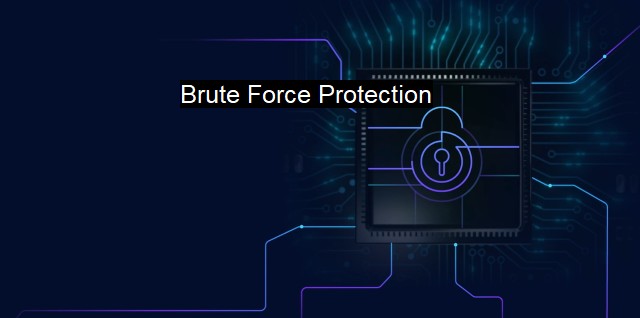What is Brute Force Protection?
The Importance of Brute Force Protection for Securing Sensitive Information in Today's Interconnected World
In the cybersecurity field, "Brute force protection" is an imperative, potent and crucial tool. It can be described as a robust defense strategy that virtually guards various forms of data and interactive interfaces from high-frequency, methodical cyber-attacks instigated by cybercriminals or malicious programs which aim to generate and try all possible combinations that could yield a potential password.Generally, hackers employ brute force attack maneuvers when other less tasking efforts to infiltrate a system prove unitsuccessful. The main rationale behind a brute force attack is relatively straightforward - to decode a password by exhausting all possible combinations and permutations until the correct one is discovered. This can be quite disastrous, especially when weak passwords are in use, making interception relatively efficient and speedy. This type of attack becomes exponentially problematic with systems that lack a secure defense mechanism in place, hence the crucial importance of brute force protection.
Brute force protection aids in the mitigation of these types of attacks by putting strict measures in place. These measures include setting a definite limit on login attempts within a certain timeframe, implementing CAPTCHAs, incorporating two-factor authentication (2FA), and monitoring repetitive failed login attempts or suspicious login behaviors. Systems with brute force protection block the offenders IP address if certain conditions are met, such as a given number of failed login attempts within a short time span. Once the IP address has been blocked, any attempts to access information using this IP address ends in futility.
The use of antivirus software also plays a pivotal role in providing brute force protection. Renowned antivirus software consisting of brute force protection capabilities does much more than just block harmful and malicious entities; it monitors system activities round-the-clock, detects repeated access attempts, and manipulates security protocols to counteract potential brute force threats. A well-known example of such security software is Kaspersky’s Brute Force Attack Blocker.
In its operation, the antivirus identifies illegal and irregular user activities, such as successive login attempts, thereby activating its blocking systems in response to potential cyber threats. The antivirus software can prevent password brute force attacks by creating an electronic shield and effecting preventive protocols when the predefined number of attempts is exceeded.
Antivirus encryptions add an additional layer of safety by managing the secure exchange of data. Encryption algorithms transform regular plain-text input into an unrecognizable jumbled-up crypto-language, making it abstract and unreadable should the information fall into the wrong hands. If an entity attempts to breach the system, the encryption in use would mean that only gibberish is accessible, hence rendering the brute force attack unfruitful.
Advanced antivirus software can provide real-time alerts on security threats so that action can be taken immediately to prevent potential brute force attacks. They also provide analytical features to monitor trends and patterns associated with failed attempts, making it easy to spot and terminate repeated attack attempts.
Brute force protection is indeed a critical aspect of cybersecurity. It offers robust countermeasures against the brute force attack tactics employed by cybercriminals—these deterrence mechanisms is a combination of activity monitoring, limiting login attempts, employing 2FA, blocking IP addresses, use of CAPTCHAs, and general system hardening. Also, the use of antivirus adds an additional precautionary layer of safety that facilitates encryption, constant surveillance, and timely alerts, thus, ensuring that confidential data is safe from unauthorized access. brute force protection provides an environment of safety and peace of mind, letting you focus on important tasks at hand without the encumbrance of operational security concerns.

Brute Force Protection FAQs
What is brute force protection in cybersecurity?
Brute force protection is a security measure that prevents cybercriminals from guessing login credentials by repeatedly attempting to enter passwords or access codes until they hit the right combination.Why is brute force protection necessary for cybersecurity?
Brute force attacks are common in the cybersecurity world, and they can be used by hackers to gain unauthorized access to sensitive information. Brute force protection helps to prevent these attacks and ensures that login credentials remain secure.How does antivirus software help with brute force protection?
Antivirus software can help with brute force protection by detecting and blocking suspicious login attempts. This can help prevent unauthorized access to sensitive information and ensure that login credentials remain secure.What are some best practices for implementing brute force protection?
To implement effective brute force protection, it's important to use strong passwords, implement two-factor authentication, limit login attempts, and regularly monitor login activity. It's also important to keep antivirus software up to date to ensure maximum protection against cyber threats.| | A | | | B | | | C | | | D | | | E | | | F | | | G | | | H | | | I | | | J | | | K | | | L | | | M | |
| | N | | | O | | | P | | | Q | | | R | | | S | | | T | | | U | | | V | | | W | | | X | | | Y | | | Z | |
| | 1 | | | 2 | | | 3 | | | 4 | | | 7 | | | 8 | | |||||||